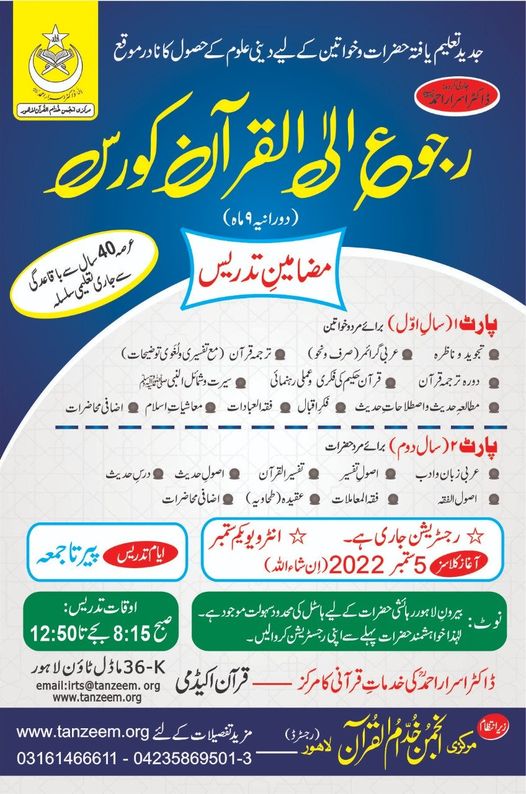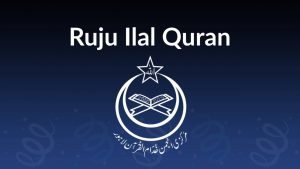Introduction

Message from Dr. Israr Ahmed
 In any case, basic knowledge of the Arabic language is essential for memorizing the Qur’an and it is not enough to look at the translation along with the text in a translated version of the Qur’an for this purpose. That a person can understand a live translation of the Qur’an on his own and become aware of its superficial meaning without looking away from the text while reciting it. It has a definite status for every educated Muslim.
In any case, basic knowledge of the Arabic language is essential for memorizing the Qur’an and it is not enough to look at the translation along with the text in a translated version of the Qur’an for this purpose. That a person can understand a live translation of the Qur’an on his own and become aware of its superficial meaning without looking away from the text while reciting it. It has a definite status for every educated Muslim.
And I don’t think that a Muslim who has read and written anything, has even learned a foreign language, has a BA and MA, has acquired difficult sciences and arts like medicine and engineering, What excuse can he give in court for not being able to learn so much Arabic that he can get an understanding of the Holy Qur’an? With all sincerity and benevolence, I urge you to refrain from such people learning Arabic and refraining from understanding the Qur’an. By this practice, we are making ourselves worthy of God’s severe interrogation and severe punishment. !
In my opinion, at least enough knowledge of the Arabic language to understand the superficial meaning of the Qur’an. Every educated Muslim has the right to the Qur’an, the non-fulfillment of which is a great injustice not only to the Qur’an but to oneself.
Ruju ilal Quran Course
(Part I)
Background and Objectives
The greatest tragedy of us Muslims in the present age is that those who get worldly education and dedicate fourteen or sixteen precious years of their lives to schools and colleges are generally completely deprived of religious education. Similarly, those in society who turn to religious schools from the very beginning for the attainment of religious education are often left far behind in the field of secular education. It is an undeniable fact that the real flow of our society is towards secular education. As a result, the vast majority of educated people have a BA or MA level despite being educated, they are completely unfamiliar with religious teachings. In fact, most of them are not even able to understand the Qur’an al-Hakim, let alone read it. It would not be wrong to call such people “literate and illiterate” religiously. However, as Muslims, one of our most important responsibilities is to acquire a basic knowledge of the religion, and especially to read the Qur’an al-Hakim as ‘the source of guidance, not only the source of faith and belief’, and from it, the guidance and advice which The treasure of this great book is contained in one verse and one line, so that practical life can be established according to although this is obligatory for every Muslim, it is obligatory for those who have spent years and years in the pursuit of worldly education. Obviously, he must learn the Arabic language to such an extent that while reading the Qur’an al-Hakim, its meaning can be understood directly without the help of a printed translation. Similarly, for the study of the Hadith of the Prophet (peace and blessings of Allaah be upon him), which is in fact a great treasure of the Qur’an and the wisdom and rules of the religion, it is essential to learn Arabic.
The main purpose of the Reference to the Qur’an course is to equip those who have completed secular education up to BA and MA with the basic knowledge that is necessary for understanding the Qur’an and gaining an understanding of the religion. As if to the students during the 9 month period.
(i) Arabic should be taught to such an extent that they can master the basic rules of the Arabic language to a great extent so that by putting in some extra effort and time, they can acquire the ability to recite the Qur’an as well as it’s meaning. It should be understood and they should not have to rely on any translation to get guidance and advice from the Qur’an.
(ii) The basic rules of Tajweed should be taught and practiced so that they can recite the Qur’an correctly.
(iii) Through the study and teaching of the selected syllabus of the Qur’an Al-Hakim, the correct and comprehensive concept of religion should be clearly presented so that it is clear to the students what our religion is, what he wants from us, and that religious responsibilities What can be the practical form of payment?
(iv) Students should be made aware of the basic principles of Hadith and the basics of Fiqh so that in the next life they can progress in these important religious sciences according to their own courage and ability and further expand the scope of their religious knowledge.
(v) Efforts should be made to enable the students to convey the message of the Qur’an Al-Hakim and the call to return to the Qur’an to others and by the command of the Holy Prophet (PBUH) that to be able to carry out the duty of advancing the blessed work of learning the Qur’an.
Subject Description and Teaching Method
Arabic Grammar
The Arabic language is fundamental to understanding the Qur’an and its grammar is the key to understanding a language. This course aims to create such talent in the students that they can learn Arabic grammar and its rules. Get acquainted (gain, obtain) with the structure so that this course may be the first step in their direct use of the Qur’an.
The course teaches Arabic in a modern way. Unlike the style of Arabic madrassas, teaching begins with a noun and when students become accustomed to Arabic words and techniques, they are taught verbs. Continuous examinations and homework during the class are used to check the academic performance of the students and special rehearsal classes are conducted for the students who are found to be weak. In addition to the exercises included in the textbooks, teachers also conduct additional exercises to better understand the rules read.
Arabic Reader
Students learn to read Arabic and its idioms as well as Arabic vocabulary Increase vocabulary.
Arabic dialogue in-class lessons will be taught through dialogue and Arabic writing will be practiced.
Selected syllabus for the study of the Qur’an
To present a comprehensive concept of religion to the students in such a way that according to the Qur’an, the basic requirements and demands of a Muslim also come to the fore. This course will also give students a special taste for understanding the rest of the Qur’an. Students are also trained to convey the universal message of the Qur’an from the point of view of invitation so that they can become preachers of the religion.
The course includes a selected Quranic syllabus. Verses have been selected from different passages and suras of the Holy Quran. This syllabus consists of about two and a half paragraphs.
Translation of the Holy Quran
This course aims to develop the ability of students to understand the literal and idiomatic translation of the Holy Quran. At the same time, points of remembrance will be pointed out during the study of the Qur’an, which will help in understanding the message of the Qur’an. The course will be taught in about five verses.
Tajweed and Memorization
To develop the ability of students to recite the Holy Quran with correct rules and procedures. Also, short surahs and hadiths of the Quran will be memorized.
Synthesis of the Qur’an with Arabic Grammar
The purpose of this course is to analyze the verses of the Holy Quran among the students(Grammatical Analysis) and their ability to syntactically. Due to lack of time, selected surahs of the Quran have been included in the syllabus. However, after reading this selected part in such a way that the students can read the rest of the Qur’an in the same way if they work a little harder. As if this course is based on the practical application of Arabic taught in the first semester.
Terms of Hadith and Study of Hadith
Introducing the students to the basic terminology of the Hadith of the Prophet (peace and blessings of Allah be upon him) and acquainting them with the great gems of the Prophet’s wisdom and sermons.
Additional Lectures
Additional lectures on the following topics will be conducted in case of time and availability of teachers.
- Biography of the Prophet(peace and blessings of Allah be upon him)
- Movement literature
- Fundamental issues of jurisprudence
- Introduction to the principles of jurisprudence
- Fundamentals of Islamic Economics
- Islamic way of life
- Thoughts of Iqbal
Certificate of Course
The certificate of this course will be issued only to those students whose overall attendance is 75% and they have not obtained less than 50% marks in each subject.
Rules and Regulations
(1)Students who are late for class, absent from lessons and monthly tests, or do not adhere to the discipline of the academy will be disciplined by the prevailing rules and regulations.
(2)If the administration noticed that a student:
- Can’t keep up with the class
- It does not have the appropriate capacity
- He joined the class just to pass the time
- If his conduct and conduct is inappropriate and detrimental to the institution, then by the prevailing rules and regulations of the academy, such students will be expelled from the academy (and in case of residency, hostel).
(3)Students who wish to stay in the college hostel and benefit from its mess will have to abide by the rules and regulations of both.
Education System
Admissions to this course are completed by the end of August. Teaching begins in early September and ends in late May. As if this course lasts for more or less 9 months.
Fees
- Admission fee (At the time of admission) Rs 200.
- Fee exams annually Rs 100.
- Library Security (Refundable) 200 Rs. Per month per student
- Tuition fees (per semester) Rs 2400
- If willing to pay Per Month then Rs 600
Note: Students should be prepared for the additional cost of approximately Rs. 1000 / – for the purchase of textbooks and support materials.
Fee Discount: For the limited number of students, there is scope for a half discount or total waiver in fees. However, any fee waiver will be decided based on the student’s past academic performance and financial circumstances. The president of the association will have the authority to decide whether to grant the concession or not.
Hostel
- Accommodation and meals for a limited number of students will be possible in the academy’s hostel.
- If the number of students seeking accommodation in the hostel exceeds the capacity, the decision will be based on their past academic performance or entrance test/interview.
- The cost of accommodation and meals in the hostel will be as follows:
Security fees (At the moment) Rs.1000 (refundable)
Cubic rent (single living room) Rs. 1500 per month
Rental dormitory (4 people in one room) 500 Rs per month per student
The cost of the mess Rs. 1800 per month (average)
Ruju ilal Quran Course
(Part II)
Background and Objectives
Our goal in this course is to equip those who have a BA or M.A. In addition to secular education, I have received religious education up to the level of the one-year recitation course “Part One”. I have a dynamic temperament and a passion to do something and sacrifice for the Muslim Ummah. It should be noted that the teaching of “Part One” of this educational series has been going on regularly in the Qur’an Academy for more or less twenty years. The completion of this course will facilitate the preaching and teaching activities and will also provide a basis for advancing the path of teaching and learning and research and creation. Details regarding the curriculum and teaching methods of this course are given below.
The Beginning and Duration of Teaching
The total duration of this course is one year. The session will start from the announced date.
Teaching Hours
For the convenience of the students, the course is divided into two equal parts (semesters). Each semester consists of a period of six months. There will be about five hours of teaching in the morning hours five days a week. Weekly holidays will be on Saturdays and Sundays.
Curriculum
- Complete translation of the Qur’an
- Principles of Jurisprudence
- Hadith
- Belief
- Jurisprudence
- Arabic language and literature
- Principles of Interpretation
- Sirat-un-Nabi(peace and blessings of Allah be upon him)
- Principles of Hadith
- Additional lectures
Brief introduction of Topics
Translation of the Qur’an (complete)
This course aims to develop the ability of students to translate and understand verbatim and eloquently so that they can spread the universal and da’wah message of the Qur’an through Quranic recitations, especially during Ramadan. It can be a help and support in our mission.
Hadith
Selecting a comprehensive book of hadith and covering all its topics such as faith, worship, affairs, economics, jihad and fighting, etiquette, preaching and wisdom, biography and the tribulations of the present time, etc., in which all the chapters of hadith are summarized. The study will be done so that the students can get guidance for their lives directly from the Qur’an as well as the Sunnah of the Prophet.
Jurisprudence
To provide a comparative study of jurisprudential issues to the students so that they can get the guidance of Islam in various aspects related to collectivism such as family system, means of livelihood, Islamic society and culture, emirate, and congregation, jihad and killing, and so on. One of the objectives of this course is to study the family, economic and political system of the ideal state of Islamic welfare in the light of jurists’ connections on solid Shariah grounds.
Principles of Interpretation
The purpose of this course is to make a comparative study of the methods of different interpretations, to introduce the correct principles of interpretation and to point out the incorrect principles, and also to introduce the various sciences and arts related to the Qur’an.
Principles of Hadith
The purpose of this course is to introduce the students to the terminology of hadith and to teach the basic principles of authenticity and weakness of hadith according to the narrators and also to give practical practice to the students to rule on a hadith.
Principles of Jurisprudence
This course includes introducing students to different types of Shariah rules and studying collective and conflicting sources of Shariah. At the same time, it is part of this course to clarify the rules of inference and their differences according to the jurists so that the ijtihad insight can be awakened in the students.
Belief
The purpose of this course is to gain knowledge of the attributes of God Almighty in the light of revelation regarding names and deeds and to teach students the beliefs of Ahl as-Sunnah wa’l-Jama’ah (the four Imams) by applying the beliefs of misguided and false sects. Students will also be introduced to the beliefs and ideologies of ancient and modern false differences.
Arabic language and Literature
The objectives of this course are to develop the ability of students to read Arabic without Arabic, to implement the rules and regulations of the Arabic language, to create an atmosphere of Arabic conversation in the classroom, and to introduce Arabic literature (prose and poetry) to the students.
Sirat-un-Nabi(peace and blessings of Allah be upon him)
The life of the Messenger of Allah (peace and blessings of Allah be upon him) is a model of beauty for us. The purpose of this course is to study the individual and collective aspects of your life in such a way that as Muslims you can become a part of our lives.
Additional Lectures
Academic lectures on the following topics will be conducted during the course. Each year the topics will be determined according to the availability and timeliness of expert scholars.
- Purification and morality
- Historical background of Islamic jurisprudence
- Hujat e Hadith
- Basic Principles of Islamic Economy
- Islamic world and revivalist movements
- History of Islam
- Movement literature
- Thoughts of Iqbal
- Islamic way of life
- Fundamental issues of philosophy
Eligibility for Admission
The following educational qualifications (minimum) are required for admission to the course.
- BA / B.Sc or equivalent degree
- Ruju ilal Quran Course (Part1 )
Certificate of Course
At the end of the course, a certificate will be formally issued by the successful student body. The certificate will be issued only to those students who have a total attendance of 75% and have scored at least 50% marks in each subject.
Note: Fee, rules and regulation, and hostel facility are the same as above course part 1.

